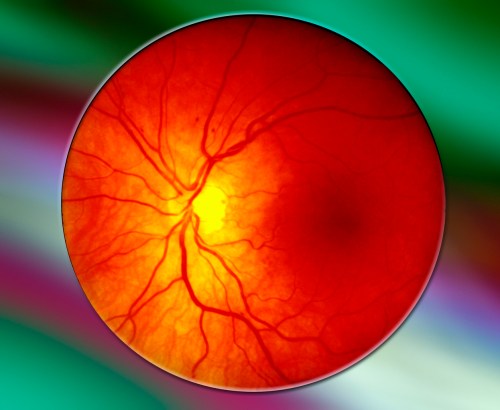
Retinopathy is a fancy word meaning disease of the retina, the light detecting membrane at the back of the eyeball. About two in five folks with diabetes have some form or degree of diabetic retinopathy. The pathology is mostly in the arterial blood vessels of the retina. Keeping blood sugars under good control is one way to prevent diabetic retinopathy. Once diagnosed, it can be treated with injections, lasers, or surgery.
Here’s the abstract from a recent scientific report the looked at the ocular effects of gastric bypass surgery in obese type 2 diabetics. Over the course of 4.5 years, the risk of diabetic retinopathy was 40% less in those who had bypass surgery.
Importance Knowledge of the incidence and progression of diabetic retinopathy (DR) after gastric bypass surgery (GBP) in patients with obesity and diabetes could guide the management of these patients.
Objective To investigate the incidence of diabetic ocular complications in patients with type 2 diabetes after GBP compared with the incidence of diabetic ocular complications in a matched cohort of patients with obesity and diabetes who have not undergone GBP.
Design, Setting, and Participants Data from 2 nationwide registers in Sweden, the Scandinavian Obesity Surgery Registry and the National Diabetes Register, were used for this cohort study. A total of 5321 patients with diabetes from the Scandinavian Obesity Surgery Registry who had undergone GBP from January 1, 2007, to December 31, 2013, were matched with 5321 patients with diabetes from the National Diabetes Register who had not undergone GBP, based on sex, age, body mass index (BMI), and calendar time (2007-2013). Follow-up data were obtained until December 31, 2015. Statistical analysis was performed from October 5, 2018, to September 30, 2019.
Exposure Gastric bypass surgery.
Main Outcomes and Measures Incidence of new DR and other diabetic ocular complications.
Results The study population consisted of 5321 patients who had undergone GBP (3223 women [60.6%]; mean [SD] age, 49.0 [9.5] years) and 5321 matched controls (3395 women [63.8%]; mean [SD] age, 47.1 [11.5] years). Mean (SD) follow-up was 4.5 (1.6) years. The mean (SD) BMI and hemoglobin A1c concentration at baseline were 42.0 (5.7) and 7.6% (1.5%), respectively, in the GBP group and 40.9 (7.3) and 7.5% (1.5%), respectively, in the control group. The mean (SD) duration of diabetes was 6.8 (6.3) years in the GBP group and 6.4 (6.4) years in the control group. The risk for new DR was reduced in the patients who underwent GBP (hazard ratio, 0.62 [95% CI, 0.49-0.78]; P < .001). The dominant risk factors for development of DR at baseline were diabetes duration, hemoglobin A1c concentration, use of insulin, glomerular filtration rate, and BMI.
Conclusions and Relevance This nationwide matched cohort study suggests that there is a reduced risk of developing new DR associated with GBP, and no evidence of an increased risk of developing DR that threatened sight or required treatment.
Steve Parker, M.D.




Pingback: El bypass gástrico reduce el riesgo de retinopatía diabética - RecetasMediterráneas